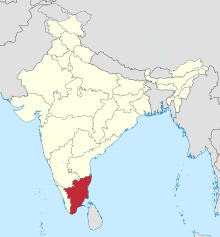LGBTQ rights in Tamil Nadu | |
|---|---|
 | |
| Status | Legal since 2018 |
| Gender identity | Third gender recognised; transgender people may change legal gender |
| Discrimination protections | Discrimination protections in line with Navtej Singh Johar v. Union of India and National Legal Services Authority v. Union of India |
| Family rights | |
| Recognition of relationships | Transgender women can marry under the Hindu Marriage Act, 1955[1] |
| Adoption | No |
| Part of a series on |
| Transgender topics |
|---|
|
|
| Part of a series on |
| LGBTQ rights |
|---|
 |
| Lesbian ∙ Gay ∙ Bisexual ∙ Transgender ∙ Queer |
|
|
Lesbian, gay, bisexual and transgender (LGBT) rights in Tamil Nadu are the most progressive among all states of India.[2][3] Tamil Nadu was the first state in India to introduce a transgender welfare policy, wherein transgender individuals can access free gender affirmation surgery in government hospitals and various other benefits and rights. The state was also the first to ban forced sex-selective surgeries on intersex infants,[4][5] and also the first state to include an amendment in its state police guidelines that expects officers to abstain from harassing the LGBTQIA+ community and its members.[6] The state also became the first to ban conversion therapy as well as the first to introduce LGBTQIA+ issues in school curricula.[7]
Same-sex sexual activity has been legal since 2018, following the Supreme Court ruling in Navtej Singh Johar v. Union of India. Tamil Nadu is noted as one of the most open states with regards to the LGBT community, particularly transgender people. Nevertheless, reports of discrimination, arranged opposite-sex marriages, bullying, suicides,[8] and family rejections are common. According to an estimate from 2015, about 16,380 people in Tamil Nadu identified themselves as LGBT.[9]
- ^ ""Transwoman A 'Bride' Under Hindu Marriage Act": Madras HC; Also Bans Sex Re-Assignment Surgeries On Intersex Children [Read Judgment]". 23 April 2019. Archived from the original on 12 July 2019. Retrieved 16 August 2020.
- ^ "LGBT community in Tamil Nadu seeks state government's support". Indianexpress.com. 15 December 2013. Archived from the original on 27 August 2018. Retrieved 18 April 2018.
- ^ Hamid, Zubeda (3 February 2016). "LGBT community in city sees sign of hope". Thehindu.com. Archived from the original on 22 December 2017. Retrieved 18 April 2018.
- ^ "1st in India & Asia, and 2nd globally, Tamil Nadu bans sex-selective surgeries for infants". The Print. 31 August 2019. Archived from the original on 7 June 2021. Retrieved 15 May 2020.
- ^ "Tamil Nadu Becomes First State to Ban So‑Called Corrective Surgery on Intersex Babies". The Swaddle. 30 August 2019. Archived from the original on 3 August 2020. Retrieved 15 May 2020.
- ^ "TN brings amendment to punish cops for harassing LGBTQIA+ persons". The News Minute. 17 February 2022.
- ^ Wavhal, Jayali (11 December 2022). "Tamil Nadu: Govt To Include LGBTQIA+ Issues In School Curricula, Aims To Work Towards Inclusivity". thelogicalindian.com.
- ^ "Not my fault I was born gay: 19-year-old commits suicide over homophobia". India Today. 9 July 2019. Archived from the original on 16 July 2019. Retrieved 6 January 2022.
- ^ "Resources and Information" (PDF). Goeiirj.com. Archived from the original (PDF) on 22 December 2017. Retrieved 18 April 2018.